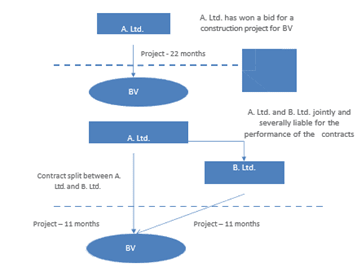On 1 January 2021 the new tax treaty between Ireland and the Netherlands entered into force. This treaty is based on the OECD BEPS project (Base Erosion and Profit Shifting) and the BEPS Multilateral Convention (Multilateral Instrument), representing an internationally recognized standard. Article 5 (Permanent Establishment) of the Tax Treaty includes the definition of the treaty concept of a permanent establishment, which is primarily used for the purpose of the allocation of taxing rights between the Netherlands and Ireland. This two-pager attempts to elaborate further on the conditions for qualifying a “building site or construction or installation project” as a permanent establishment.
1. Permanent establishment (PE)
A PE is a a fixed place of business through which the business of an enterprise is wholly or partly carried on. This concept makes it possible to identify the source of a profit and to guarantee the state in which a PE is located to tax the profits of the company which are attributable to the PE. Income from an activity that is not considered a PE within the meaning of the treaty may not be taxed in the state where the entity is located
2. What constitutes a PE?
A significant taxable presence in a contracting state of a person resident in the other contracting state takes the form of a PE if such taxpayer meets in the first contracting state all necessary requirements, namely:
- dependency: the PE must belong to a person resident in the other contracting state
- physical presence: the person resident in the other contracting state must have a physical presence in the Netherlands;
- permanence: the place of business must be fixed and the activity must be carried on continuously;
- actual carrying on of a business through the place of business: a place of business situated in the Netherlands must be available for the activities of the non-resident taxpayer; and
- the activity must not have an auxiliary or preparatory character.
Based on the tax treaty the term PE includes especially:
- a place of management
- a branch
- an office
- a factory
- a workshop and
- a mine, an oil or gas well, a quarry or any other place of extraction of natural resources.
2.1 Exemption for preparatory and auxiliary business activities
The tax treaty includes a list of preparatory and auxiliary business activities that are specifically excluded from creating a PE:
- purchasing goods or merchandise for the enterprise;
- storing goods or merchandise for the enterprise;
- displaying goods or merchandise for the enterprise;
- conducting advertising or promotional activities for the enterprise;
- maintaining a stock of goods for the enterprise;
- delivering goods from stock on behalf of the enterprise;
- providing after-sales services or maintenance for products sold by the enterprise.
3. Construction PE
The term PE also includes a construction PE:
a building site or construction or installation project constitutes a PE only if it lasts more than twelve months (12-month minimum threshold).
3.1 Interpretation
The terms building site and construction or installation project are generally understood to include not only the construction of buildings, but also the construction of roads, bridges or canals, the renovation of buildings, roads, bridges or canals, the laying of pipelines and excavating and dredging activities, installation related to a construction project, as well as the installation of new equipment. The terminology used is understood as to also encompass on-site planning and supervision.
3.2 Time threshold on a project-per-project basis
The 12-month minimum threshold is generally interpreted in the Netherlands as to be applied on a project-per-project basis.
A building or construction or installation site exists for Dutch tax purposes from the date the (sub)contractor begins its work in the territory in which the site is to be established. Such a site is considered to continue to exist until the work is completed or permanently abandoned.
A site does not cease to exist when the work is only temporarily discontinued, e.g. by seasonal interruptions because of bad weather or other temporary interruptions, for example, due to shortage of material or labour issues.
4. Artificial avoidance of PE status
4.1 Splitting-up contracts
In the tax treaty a provision has been included that it is not possible to avoid PE status by splitting-up contracts between closely related enterprises once the 12-month minimum threshold has been exceeded.'

Figure 1: example splitting-up contacts
4.2 Splitting-up cohesive operation business into several small operations
Activities of a preparatory of auxiliary character do not qualify as a PE. However, it is not possible to avoid PE status by fragmenting a cohesive operating business into several small operations in order to argue that each part is merely engaged in preparatory or auxiliary activities that benefit from the PE status exception.
The general view in the Netherlands is that only core business activities are eligible to constitute a PE. The question of whether any of performed activities are of a preparatory or auxiliary character is assessed against the background of the taxpayer’s overall activities. Of relevance in this regard is whether the activities performed are to be considered core activities in light of the overall business operation or serve a mere supportive purpose in that regard.
Contact us
Should you have any comments or questions, or if you require our assistance with assessing whether your group is compliant to the PE legislation, feel free to contact us at any time.

